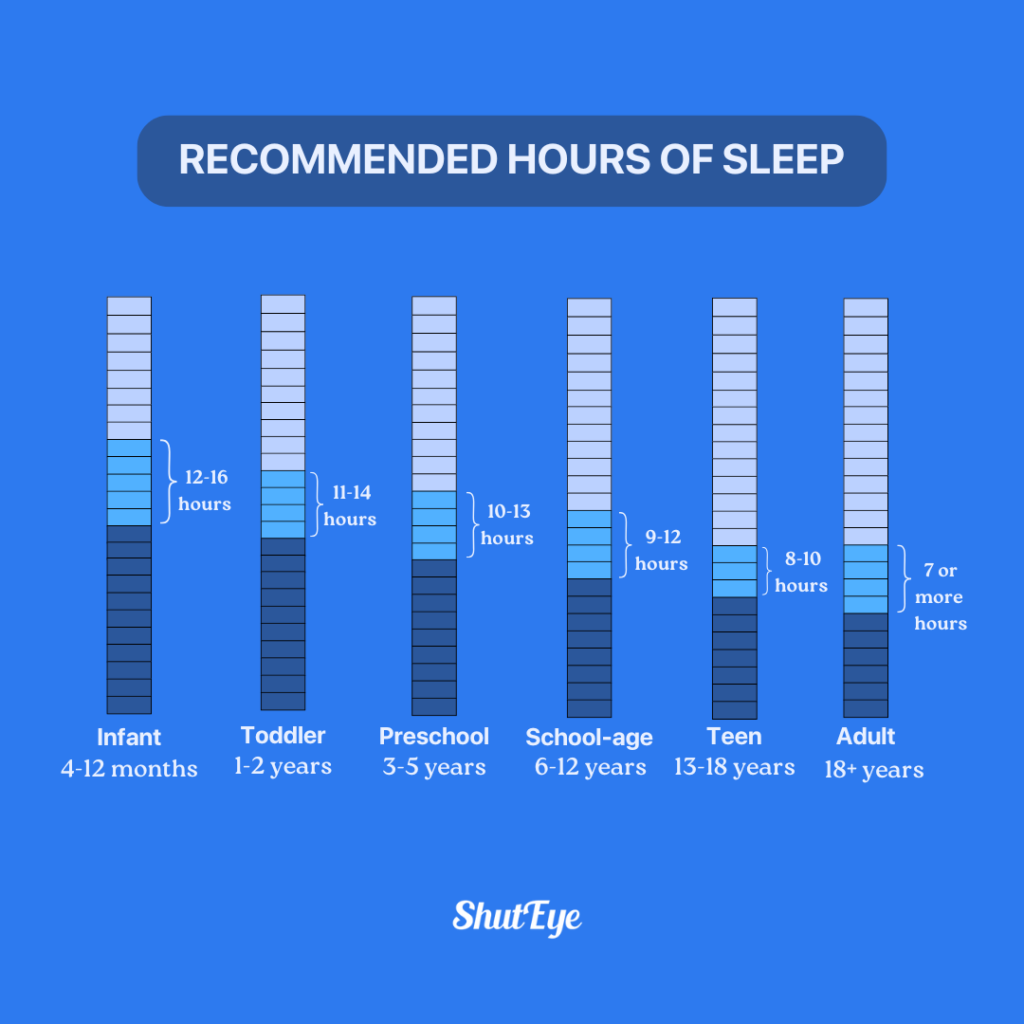


Looking to boost your well-being? Look no further than the power of sleep. We’ll explore the benefits sleep can bring to your life. From improved mood and stress relief to a healthier heart, discover how sleep plays a crucial role in your physical and mental health and some tips for better sleep.
Getting good sleep regularly has numerous health benefits for your physical and mental health. When you prioritize sleep, you allow your body to restore and rejuvenate itself, leading to improved mood and reduced stress levels.
It also plays a role in regulating your blood pressure, lowering the risk of diabetes, and maintaining good mental and physical performance. This is not only applicable to adults but also to children [1].

According to the American Academy of Sleep Medicine (AASM) and Sleep Research Society (SRS), it is recommended that adults get 7 to 9 hours of sleep every night for optimal health and functioning. Getting less than 7 hours of sleep may increase the risk of weight gain, hypertension, diabetes, stroke, depression, and risk of mortality. At the same time, oversleeping may pose some health risks except for those who are trying to recover from sleep debt or illnesses [2].
For children, the recommended amount of sleep depends on their age and individual biology. In general, it is recommended for infants up to 12 months to get between 12 to 16 hours of sleep, children of 1 to 2 years of age to get between 11 to 14 hours of sleep, children of 3 to 5 years of age to get 10 to 13 hours of sleep while children of 6 to 12 years of age to get 9 to 12 hours of sleep.
We know that sleep plays an essential role in maintaining good health but how so?
Here are the 7 main benefits of getting proper sleep:

Sleep affects the heart in many ways. Getting enough sleep helps to improve and maintain good heart health. Getting healthy sleep is one of the components listed by the American Heart Association under their ‘Life’s Essential 8’ checklist for good cardiovascular health [3].
When you do not get enough amount of sleep that your body needs, it increases inflammation within the body. This inflammation contributes to health issues such as high blood pressure, high cholesterol, and diabetes. It also increases the risk of heart disease and stroke [4]. Hence why it is important to prioritize sleep and adopt good sleep habits.

If you’re trying to maintain a healthy weight, your primary focus would likely be to adopt a healthy diet and limit unhealthy foods. While this is an important factor in weight management, there’s often another factor that people tend to overlook— that is sleep!
According to studies, sleep deficiency is one of the risk factors for obesity. Those who were sleep deprived and slept less than 5 hours a day had a higher BMI and weight gain compared to those who had gotten sufficient sleep [5].
Additionally, sleep experts from Yale Medicine also suggest that sleep deprivation creates an imbalance in the appetite-regulating hormones— ghrelin and leptin. Leptin is responsible for making us feel full and it typically rises during sleep. When we don’t get enough sleep, this hormone decreases and contributes to the feeling of hunger. Excessive hunger may cause you to eat excessively, resulting in weight gain [6].
When you get enough quality sleep, your immune system is restored and strengthened. Sleep plays a vital role in supporting and maintaining a healthy immune system [7]. During sleep, your body produces and releases important proteins called cytokines, which help regulate immune responses and fight off infections.
A lack of sleep can weaken your immune system, making you more susceptible to common illnesses like colds and flu. On the other hand, adequate sleep can enhance your immune response, allowing your body to effectively combat infections and stay healthy.

Another benefit of sleep is that it can help to reduce the risk of injury. Sleep allows the body to repair tissues and stimulate muscle growth [8]. When you get insufficient sleep, it slows down the recovery process and also increases the risk of getting an injury.
Also, insufficient sleep increases the risk of motor vehicle accidents, sports injuries, or work-related injuries [9]. Therefore, it is important to maintain a healthy sleep duration.
Every night when we sleep, our brain will consolidate all the information and memories that we gathered during the day. This process typically happens when we are in deep sleep, also known as the slow-wave sleep stage, helping us to retain and recall important information. It also helps us with our concentration and cognitive function so that we can stay focused throughout the day [10].

Sleep is a crucial and necessary human function. When we do not get enough sleep, even by the slightest amount, it can negatively affect our memory, decision-making ability, and our mood. According to survey findings in America, many adults have reported that their stress levels increase when the length and quality of their sleep decreases [11].
Studies also show that people who have gotten only 4.5 hours of sleep a night for one week reported feeling more stressed, upset, and mentally exhausted. However, when we get enough sleep, it lowers cortisol levels and improves our overall mood [12]. If lack of sleep is attributed to sleep problems such as insomnia, it’s important to assess our sleep habits or seek the advice of a healthcare provider about it.
If you want to improve your sleep quality, consider implementing these sleep hygiene tips for better sleep:
1. Establish a consistent sleep schedule: Go to bed and wake up at the same time every day to regulate your body’s internal clock.
2. Create a relaxing bedroom environment: Make sure your bedroom is dark, quiet, and cool to promote optimal sleep conditions.
3. Avoid consuming stimulants: Limit your intake of caffeine, nicotine, and alcohol before bedtime, as they can disrupt your sleep patterns.
4. Exercise during the day: Engaging in regular physical activity can help improve your sleep quality and promote better overall health.
Getting more sleep is important for your health and has numerous benefits. By following these tips, you can create an environment conducive to better sleep and establish healthy sleep habits.
Prioritizing sleep can have a profound impact on your overall well-being. Getting enough sleep can support good heart health, help with weight management, maintain a good immune system, reduce the risk of injury, and improve mood. By following some simple tips for better sleep, you can unlock these incredible benefits and transform your life.
If you want to learn how you can improve the quality of your sleep, consider trying the ShutEye® app. ShutEye helps you to track and monitor your sleep patterns, offering valuable sleep tips to improve it gradually. Download for FREE today and start getting a good night’s sleep.
American Heart Association (2025) Life's Essential 8 [online]. Available at: https://www.heart.org/en/healthy-living/healthy-lifestyle/lifes-essential-8
American Psychological Association (2013) Stress and Sleep [online]. Available at: https://www.apa.org/news/press/releases/stress/2013/sleep
Besedovsky, L., Lange, T., & Born, J. (2011). Sleep and immune function. Pflugers Archiv, 463(1), 121 [online]. Available at: https://doi.org/10.1007/s00424-011-1044-0
Cultivating Health (2023) Better sleep: Why it’s important for your health and tips to sleep soundly [online]. Available at: https://health.ucdavis.edu/blog/cultivating-health/better-sleep-why-its-important-for-your-health-and-tips-to-sleep-soundly/2023/03
Harvard Medical School (2021) Sleep and Mood [online]. Available at: https://sleep.hms.harvard.edu/education-training/public-education/sleep-and-health-education-program/sleep-health-education-87
Harvard Medical School (2021) Why Sleep Matters: Consequences of Sleep Deficiency [online]. Available at: https://sleep.hms.harvard.edu/education-training/public-education/sleep-and-health-education-program/sleep-health-education-45
King, J. (2017) How Inadequate Sleep Impacts Your Injury Risk [online]. Available at: https://www.hawaiipacifichealth.org/healthier-hawaii/be-healthy/how-inadequate-sleep-impacts-your-injury-risk/
Panel, C. C., Watson, N. F., Badr, M. S., Belenky, G., Bliwise, D. L., Buxton, O. M., Buysse, D., Dinges, D. F., Gangwisch, J., Grandner, M. A., Kushida, C., Malhotra, R. K., Martin, J. L., Patel, S. R., Quan, S. F., & Tasali, E. (2015). Recommended Amount of Sleep for a Healthy Adult: A Joint Consensus Statement of the American Academy of Sleep Medicine and Sleep Research Society. Sleep, 38(6), 843 [online]. Available at: https://doi.org/10.5665/sleep.4716
The Nutrition Source (2025) Sleep [online]. Available at: https://nutritionsource.hsph.harvard.edu/sleep/
UCLA Health (2024) Why sleep is good for your heart [online]. Available at: https://www.uclahealth.org/news/article/why-sleep-good-your-heart
Wheaton AG, Olsen EO, Miller GF, Croft JB. Sleep Duration and Injury-Related Risk Behaviors Among High School Students — United States, 2007–2013. MMWR Morb Mortal Wkly Rep 2016;65:337–341. Available at: http://dx.doi.org/10.15585/mmwr.mm6513a1
Yale Medicine (2023) The Connection Between Sleep, Diabetes, and Obesity [online]. Available at: https://www.yalemedicine.org/news/sleep-diabetes-and-obesity